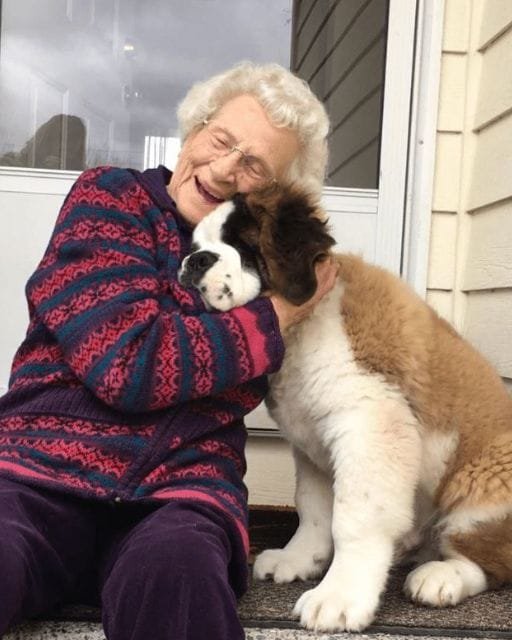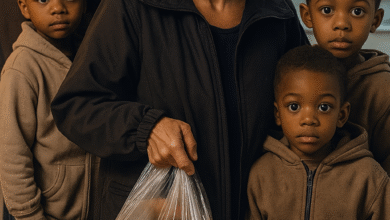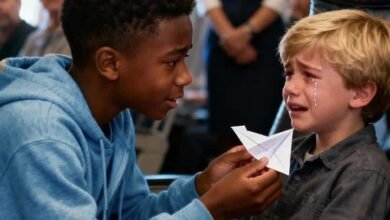I THOUGHT MOM WAS JUST FEEDING THE NEIGHBOR’S DOG — UNTIL I SAW HER FACE WHEN HE LEFT.

I had no idea how lonely she had become. Not at all.
After Dad passed, I called her once a week. I visited when I could. I sent her those odd farmer’s market jams she liked, hand-knitted socks, crossword puzzles. It felt like enough. She sounded fine, so I convinced myself she was fine.
Then I came home for the weekend and saw her sitting on the porch with a dog I didn’t recognize — a huge, awkward St. Bernard, all drool and fluff. She had one hand on his back, the other wrapped around a cup of tea, and this look on her face… maybe it was peace. Or something like it. Like she hadn’t felt truly seen in a long, long time.
“Oh, this is Murphy,” she said. “I’m watching him while Mark’s out of town.”

I thought it was sweet — until I realized Murphy wasn’t just a visitor. He was her shadow. He followed her from room to room. He waited outside the bathroom. He sat beside her chair during dinner. When she laughed, he wagged his tail like he’d done something amazing. And when she fell quiet — when the grief crept in, as it always does — he would rest his head in her lap, like he knew.
I asked her how long she’d been watching him.
“Oh, just a few days,” she said.
But I noticed the way her eyes tracked him constantly, like she was bracing herself for something.
When Mark returned, Murphy was thrilled. He barked, ran in circles. But Mom… Mom didn’t move. She just sat there, hands tightly folded, eyes distant. Like she was letting go of something she hadn’t realized she needed.
When Mark clipped on the leash, Murphy hesitated. Turned around. Looked back at her like he didn’t understand.
And that’s when I made a decision — one she still doesn’t know about.
I got up early the next morning. The house was quiet, aside from the low hum of the coffee maker. Mom was still asleep, so I slipped outside with my phone.
Mark was loading bags into his car. He looked surprised to see me, but smiled warmly.
“Hey, Clara,” he said. “How’s your mom doing?”
I paused before answering.
“She’s… hanging in there. Hey, Mark — could we talk about Murphy for a second?”
His smile faded a bit. “Sure. What’s on your mind?”
I took a deep breath.
“I’ve seen how much Mom enjoys having him around. It’s like he fills a space none of us realized was empty. I think she needs him more than either of us knew.”
Mark scratched the back of his neck and frowned.
“I get that. But Murphy’s my buddy. He’s family. And he’s… a lot of work.”
“I know,” I said quickly. “I’m not asking you to give him up. Just maybe… consider sharing him? Like, letting him split his time between your place and hers? That way, you still have him whenever you need, and she still gets the comfort she clearly needs.”
Mark looked at me for a long moment and finally exhaled.
“You’re right. She really does seem… different with him. Happier. I’ll think about it.”
I thanked him and went back inside, feeling lighter. When I walked into the kitchen, Mom was sitting at the table, staring out the window — the same window where Murphy had been not long ago. Her expression was filled with a quiet longing, and it broke my heart.
That afternoon, I took her to the park. We walked slowly along the trails, leaves crunching beneath our feet. For the first time in years, she opened up about how hard things had been since Dad died. How the house felt empty without him. How having someone — or something — to share daily life with meant more than the phone calls or the visits, even though she appreciated them.
By the time we returned home, I knew I’d made the right call. Still, I didn’t mention anything — just in case it never came to be.
But a few days later, Mark showed up unexpectedly — with Murphy trotting beside him.
I watched as Mom froze mid-step, her eyes wide with disbelief. My heart raced.
Mark gently handed her the leash.
“Clara told me you two had really bonded. I thought maybe… Murphy could spend some time here too. If that’s okay with you.”
Mom couldn’t speak at first. Then she pulled him into a hug, tears in her eyes.
“Thank you,” she whispered. “Thank you so much.”
Everything changed after that.
Little by little, Mom began to heal. She started taking daily walks again. She chatted with neighbors. She even began volunteering at the local animal shelter — always with Murphy at her side. She cooked more (“for Murphy,” she claimed), laughed more often, and even hosted friends for game nights.
But things got complicated again a few months later. Mark came by — without Murphy. He slumped onto the couch, looking defeated.
“What’s wrong?” Mom asked, concerned.
He sighed deeply.
“I lost my job last week. The company downsized. I might have to move soon — rent’s getting impossible.”
Mom looked at him, then at me. Then she said quietly:
“If you need a place to stay for a while… we have a guest room.”
Mark blinked. “Seriously?”
“Of course,” she said, firmly. “You’ve been a good friend — and family to us. It’s the least we can do.”
In the weeks that followed, a new rhythm formed. Mark moved into the guest room. He helped around the house, joined us for dinner. Murphy, thrilled to have everyone under one roof, was the glue that kept us together. The house felt alive again — full of laughter, stories, warmth.
Mark slowly opened up about his struggles. Mom began telling old stories about Dad she hadn’t told in years. One night, while we played cards around the fireplace, Mark looked around and smiled.
“You know,” he said, “I never expected this. But… it really feels like family here.”
And that’s when I realized — none of us had known how to fill the hole Dad left behind. But instead of trying to replace him, we’d created something new. Something beautiful. And unexpected.
Months turned into a year. Mark found a new job nearby — and decided to stay. The three of us (plus Murphy, of course) built a life none of us could’ve imagined.
Grief was still there, but softer now. It no longer defined us.
In the end, I learned that love doesn’t disappear when someone leaves — it transforms. It finds new ways to bind us to memories, to each other, and sometimes even to strangers who become family.
So if you’ve ever felt stuck in loss, remember: healing isn’t about going back to what was. It’s about being open to what could be.
If this story touched you, please share it. Let’s remind one another that there is always hope. ❤️





